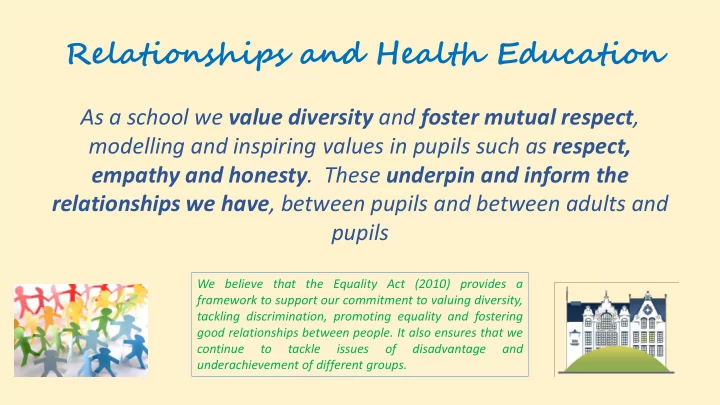

Relationships and Health Education As a school we value diversity and foster mutual respect , modelling and inspiring values in pupils such as respect, empathy and honesty . These underpin and inform the relationships we have , between pupils and between adults and pupils We believe that the Equality Act (2010) provides a framework to support our commitment to valuing diversity, tackling discrimination, promoting equality and fostering good relationships between people. It also ensures that we continue to tackle issues of disadvantage and underachievement of different groups.
Relationships and Health Education
Why is the curriculum changing? What is changing? What are the next steps?
Why is the curriculum changing? PSHE is not currently compulsory but Ofsted expect schools to be teaching about healthy lifestyles and keeping safe Government guidance on Sex and Relationships Education Guidance is now 20 years old Children need to know how to be healthy, stay safe and make healthy and positive relationships. The changes mean that the curriculum will be relevant for our children, living in the 21 st century Making Relationships and Health Education statutory will equip your child with the knowledge to make informed decisions about their wellbeing, health and relationships as well as keep them safe and prepare them for adult life. It builds on what is working well in many schools at the moment rather than a major overhaul.
What are the changes? These subjects will be compulsory in all schools from September 2020 • Health Education in primary and secondary • Relationships Education in primary • Relationships and Sex Education (RSE) in secondary All schools includes free schools, academies, Independent and faith schools
What is changing? Health Education • Mental wellbeing • Internet safety and Relationships Education harms • Families and people who care for • Physical health and me fitness • Caring friendships • Health eating • Respectful relationships • Drugs, alcohol and • Online Relationships tobacco • Being Safe • Health and prevention • Basic first aid • Changing adolescent body
What about Sex Education? • The government is NOT making sex education statutory in primary schools • Aspects of the Science National Curriculum that cover the biological aspects of sex education will continue to be statutory • Puberty will be included in statutory Health Education
What should primary schools teach? National Curriculum Science Year 1 Identify, name, draw and label the basic parts of the human body associated with each sense Year 2 Notice that animals, including humans, have offspring which grow into adults Year 5 Describe the life process of reproduction in some plants and animals Describe the changes as humans develop to old age
What about Sex Education? A primary school can decide to teach sex education in addition to what is taught in statutory science and health education
Do parents have the right to withdraw children? Yes- but only from sex education that is in addition to statutory Science and Health Education From Sept 2020 Parents cannot withdraw from statutory • Science • Relationships Education • Health Education
Key Aspects of DfE Guidance • Schools decide what to teach at what age / year group and how they teach the content • Ensure content is accessible to all pupils including SEND • Take account of the needs of vulnerable pupils and the religious background of pupils when planning and teaching the subjects • Consult with parents about the policy • Expect all schools to teach about different families
Expect all schools to teach about different families eg LGBT and the importance of equality and respecting difference The government guidance states that pupils should be taught about the society in which they are growing up . The new subjects are designed to foster respect for others and for difference , and educate pupils about healthy relationships.
Children have opportunities to talk about their special people and family. This is an effective way of encouraging children to be open about their families. This happens from our two year old provision and throughout EYFS.
Key Aspects of DfE Guidance • Produce a Relationships Education Policy • Consult parents about the policy including the curriculum • Tell parents what will be taught and when (particularly sex education before Y6) • Offer support in talking to their child about sex education and how to link this with what is being taught in school
Is this very different compared to now? Our comprehensive PHSE already covers most of the topics that will become statutory; • healthy eating • physical activity • drugs, alcohol and tobacco education • sex and relationships education • safety (including bullying and online safety) • mental health and wellbeing We will need to do more about marriage ,basic first aid, hygiene and sleep
Relationship Education Policy • Definition of Relationships Education • Information about why parents do not have the right to withdraw their child • What is taught, how it is taught and who teaches it • How the subject is monitored and evaluated • Date policy will be reviewed If schools want to teach any sex education in addition to Science and Health Education, they can produce a policy (not statutory) and cover • Definition of sex education • Parents right to withdraw
Recommend
More recommend